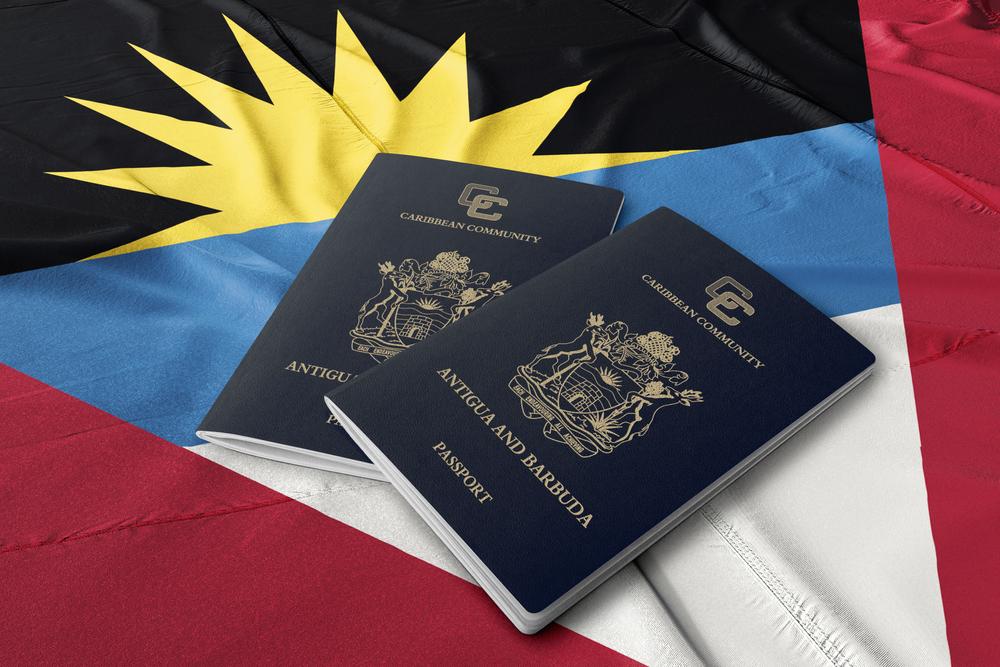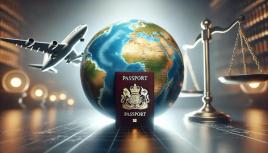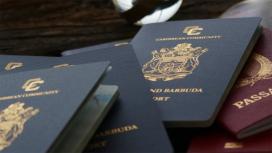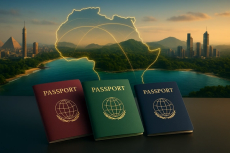Blog • Published on:July 10, 2024 | Updated on:November 23, 2024 • 7 Min
Pros and Cons of Dual Citizenship & Naturalisation Through Residency
Pros and cons of dual citizenship must be understood before embarking on this journey. But first, let’s clarify what dual citizenship entails and how it is different from naturalisation. Dual citizenship, also known as multiple citizenship or plural nationality, refers to the legal status of an individual holding citizenship of two or more countries simultaneously.
Naturalisation through residency, on the other hand, is the process by which a foreign national acquires citizenship of a country after fulfilling specific residency requirements. These two concepts are intertwined, as naturalisation through residency can sometimes lead to dual citizenship, depending on the laws of the countries involved.
What are The Differences Between Residency and Citizenship?
Before knowing the pros and cons of dual citizenship and naturalisation, let’s understand the differences.
It’s important to understand the distinction between residency and citizenship, as they are often conflated but represent different legal statuses.
What is Residency?
Residency refers to the legal right to live and work in a country for a specific period, usually granted through various types of visas or residency permits. Residency does not automatically confer citizenship rights and privileges.
What are the Types of Residencies?
Common types of residencies include:
- Temporary Residency: Granted for a fixed duration, often tied to employment, study, or family relationships.
- Permanent Residency: Allows an individual to live and work indefinitely in a country without citizenship, subject to certain conditions.
What are the Types of Residency Permits?
There are various types of residency permits or visas that can be obtained, depending on the country and the individual’s circumstances. Some common examples include:
- Work Visas: Granted to individuals who have secured employment in the country, often sponsored by an employer.
- Student Visas: Issued to individuals pursuing educational opportunities, such as attending universities or vocational programs.
- Family Visas: Granted to spouses, children, or other close relatives of citizens or permanent residents.
- Investment Visas: Offered to individuals who make significant investments in the country, often through business ventures or real estate purchases.
- Retirement Visas: Available for retirees or individuals of certain ages who can demonstrate sufficient financial resources to support themselves.
The specific requirements, validity periods, and rights associated with each type of residency can vary widely between countries.
Residency status typically comes with limitations, such as restrictions on voting rights, access to certain government services, and the potential need for periodic renewal or extension.
What is Citizenship?
Citizenship, on the other hand, is a legal status that grants an individual full political, economic, and social rights within a nation-state. Citizens are entitled to a range of rights and privileges, including the ability to vote, hold public office, access government services and benefits, and obtain a passport for international travel.
How to Acquire Dual Citizenship?
Dual citizenship can be acquired in several ways:
- Birth: An individual can acquire dual citizenship at birth if their parents hold different nationalities or if the country of birth and the parents’ country of origin have different citizenship laws.
- Marriage: Some countries allow foreign spouses of their citizens to acquire citizenship while retaining their original nationality, leading to dual citizenship.
- Naturalisation: An individual can obtain citizenship through naturalisation in a new country while retaining their previous citizenship, provided that both countries permit dual citizenship.
Dual citizenship can offer various advantages, such as the ability to live, work, and travel freely in multiple countries, access to social services and benefits in both nations, and the potential to pass on multiple citizenships to children. However, it can also come with certain responsibilities, such as tax obligations, military service requirements, and voting rights in both countries.

Common types of residencies include temporary residency, granted for a fixed duration often tied to employment, study, or family relationships, and permanent residency, allowing individuals to live and work indefinitely in a country without citizenship, subject to certain conditions.
What is Naturalisation Through Residency and What are Its Requirements?
Naturalisation through residency is a common path to citizenship for foreign nationals who have lived in a country for a specified period. The residency requirements and the process for naturalisation vary from country to country, but generally involve the following steps:
- Residency Period: Most countries require a minimum number of years of continuous or cumulative legal residency before an individual can apply for naturalisation. The residency period can range from a few years to over a decade, depending on the country’s laws.
- Language and Civic Knowledge Requirements: Applicants for naturalisation may be required to demonstrate proficiency in the official language(s) of the country and pass tests on the country’s history, government, and civic values.
- Good Character and Security Checks: Applicants must typically have a clean criminal record and pass security and background checks to ensure they pose no threat to the country’s security or public safety.
- Oath of Allegiance: Upon meeting all requirements, applicants are typically required to take an oath of allegiance or citizenship, pledging loyalty to the new country.
The naturalisation process can be lengthy and complex, often involving extensive paperwork, fees, and interviews. Additionally, some countries may require applicants to renounce their previous citizenship upon naturalisation, while others allow dual citizenship.
How Long Does It Take to Naturalise?
Each country has its own naturalisation act and regulations. The time needed to naturalise through residency differs from one country to the next, and it depends largely on each country’s specific laws.
The table below shows the number of years a person needs to reside in each country to qualify for naturalisation.

Important Facts to Consider While Pursuing Naturalisation Through Residency
It is important to know a few facts:
- Some countries have favoured genders, meaning that only one gender (usually women) can naturalise under the country’s regulations.
- Some countries have naturalisation laws in place, but even if a person meets those requirements, granting citizenship falls under the government’s sole discretion.
- Residency may not be enough to qualify for citizenship in some countries, as it may need to be coupled with other legal issues such as marriage, birth, or otherwise.
Cons of Dual Citizenship: Restrictions and Limitations
While many countries recognise and permit dual citizenship, some nations have restrictions or limitations on the acceptance of multiple nationalities. These restrictions can be based on various factors, such as:
- Nationality at Birth: Some countries do not recognise dual citizenship acquired at birth and require individuals to choose one nationality upon reaching adulthood.
- Military Service: Countries with mandatory military service may require individuals with dual citizenship to fulfil their military obligations or risk losing one of their nationalities.
- Governmental Positions: Certain high-level governmental positions or security clearances may require individuals to hold only one citizenship to avoid potential conflicts of interest.
- Complete Non-recognition: A handful of countries, such as China and India, do not recognise dual citizenship at all and require individuals to renounce their previous citizenship upon acquiring a new one.
Implications of Dual Citizenship
While dual citizenship can provide numerous advantages, it can also have implications that individuals should consider:
- Tax Obligations: Dual citizens may be required to pay taxes in both countries, depending on their residency status and the countries’ tax treaties.
- Military Service: Some countries may require dual citizens to fulfil military service obligations or face potential loss of citizenship.
- Voting Rights: Dual citizens may have the right to vote in both countries, but they should be aware of any restrictions or requirements.
- Diplomatic Protection: In certain situations, dual citizens may face limitations in seeking diplomatic protection from one of their countries when in the other country.
- Inheritance and Property Rights: Laws regarding inheritance and property ownership for dual citizens may vary between countries.

While many countries allow dual citizenship, some impose restrictions based on factors like nationality at birth, military service, governmental positions, or complete non-recognition.
Pros of Dual Citizenship and Its Benefits
- Freedom of Movement: Dual citizens can travel, live, and work freely in multiple countries without the need for visas or work permits, providing greater mobility and opportunities.
- Access to Services and Benefits: Dual citizens can access social services, healthcare, education, and other government benefits in multiple countries, depending on their residency status.
- Increased Economic Opportunities: Dual citizenship can open up employment, investment, and business opportunities in multiple countries, allowing individuals to take advantage of different economic landscapes.
- Cultural and Family Ties: Dual citizenship can help individuals maintain strong cultural and family connections with multiple countries, preserving their heritage and facilitating easier travel and communication.
- Potential Tax Advantages: In some cases, dual citizens may be able to take advantage of tax treaties or other arrangements between countries, potentially reducing their overall tax burden.
- Increased Security and Stability: Dual citizenship can provide a sense of security and stability, as individuals no longer need to worry about the potential expiration or renewal of residency permits or visas.
Moving Ahead
It is essential for individuals considering dual citizenship or naturalisation through residency to thoroughly research and understand the laws and regulations of the countries involved.
Consulting with immigration professionals such as Savory & Partners can help navigate the complexities and ensure compliance with all applicable laws and requirements.
To know more about dual citizenship and naturalisation, contact Savory & Partners today to book a comprehensive consultation with one of our experts.
Written By

João Silva
João Silva is a seasoned consultant in the global mobility industry with over 12 years of experience. Specializing in European residency and citizenship by investment programs, João has assisted hundreds of high-net-worth clients in securing their second citizenship through strategic investments in real estate and government bonds.
Related Articles









Recently Published









Book a free consultation


